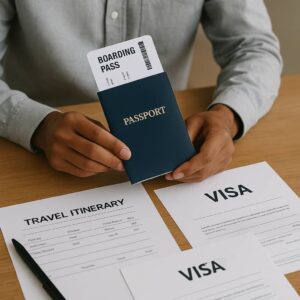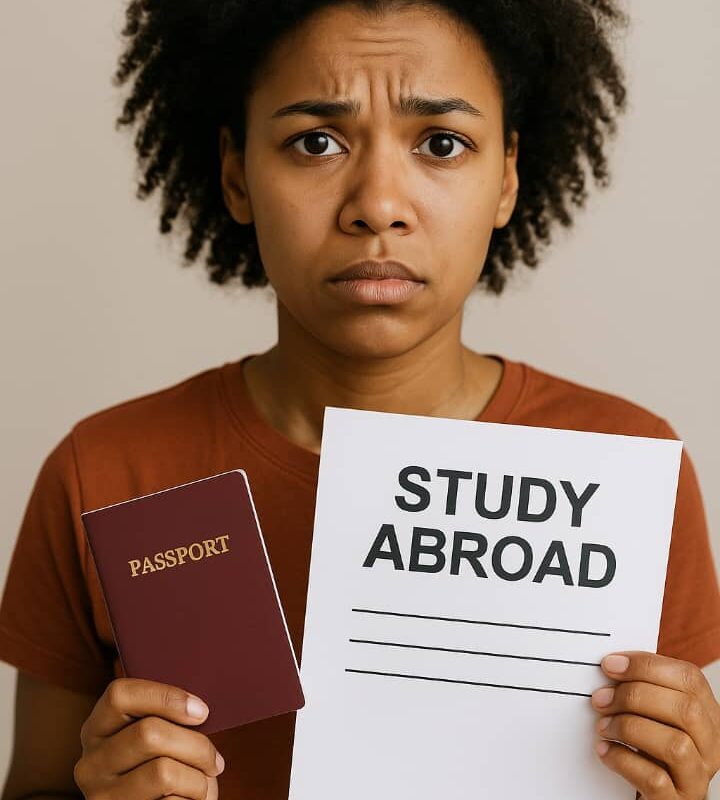INTRODUCTION:

Documents Needed to Study Abroad: Your Definitive Checklist
Studying abroad is one of the most exciting leaps you can take. But before you pick your flight, dorm room or wanderlust map, there’s a stack of paperwork that must be ready because missing the right “documents needed to study abroad” can mean delays, disappointment or even denial. This guide breaks it all down: what you need, when to start, and how to stay on top.
Why the phrase “documents needed to study abroad” matters
When you search for “documents needed to study abroad”, you’re tapping into a crucial step: the logistics behind your dream. Universities, visa offices and immigration authorities all require proof -proof of identity, proof of funds, proof of acceptance. Without these, even the best grades or biggest dreams won’t get you far.
For instance, one blog says: “At minimum, you need a valid passport, sealed academic transcripts, official test scores, SOP, LORs, resume, and proof of financial support.” GradRight+1
So, let’s unpack all that and give you a clear roadmap.
What are the main categories of documents needed to study abroad
Here’s a breakdown of major categories each one contains its own set of items you’ll likely need:
1. Identity & travel documents
These are the foundational items for any international move.
-
Valid passport (with enough validity beyond your programme end-date) studyabroad.illinoisstate.edu+1
-
Student visa or residence permit for your host country GlobalGrads+1
-
Copies / backup of passport, visa, and other travel IDs (always keep digital and physical backups) Go Overseas+1
2. Academic documents
These show you meet entry requirements for your programme.
-
Previous school/university transcripts and mark sheets. upGrad+1
-
Degree certificates (if you’re applying for postgraduate study) or high school diploma (for undergrad) Global Admissions+1
-
Test scores: language proficiency (e.g., IELTS/TOEFL) if required by the country/university. Times Higher Education (THE)+1
-
Statements of Purpose (SOP), Letters of Recommendation (LORs), Resume/CV. upGrad
3. Financial & funding documents
Money talks and you’ll need to show you can sustain your stay.
-
Bank statements showing sufficient funds, or proof of scholarship/loan. GradRight+1
-
Sponsor affidavit or financial support letter if someone else is funding you. GlobalGrads+1
-
Tuition payment receipts or funding confirmation from the institution.
4. Health, insurance & travel safety
Staying healthy abroad is part of the journey.
-
Health / medical certificate, vaccination records as required. Times Higher Education (THE)+1
-
Travel and health insurance policy, especially for the host country stay. GlobalGrads+1
5. Offer & accommodation documents
These tie your admission to your stay abroad.
-
University acceptance letter, enrolment confirmation. GlobalGrads+1
-
Accommodation contract / proof of residence or housing plan in host country. Times Higher Education (THE)+1
-
Flight tickets, travel itinerary (sometimes requested for visa or immigration). sjny.edu+1
Documents Needed to Study Abroad Comparison Table
Here’s a handy table to compare what’s always required, what’s commonly required, and what’s destination-specific.
| Document Type | Always Required | Frequently Required | Destination / University Specific |
|---|---|---|---|
| Passport | Yes | — | Validity may vary (often 6 months beyond stay) studyabroad.illinoisstate.edu+1 |
| Student Visa / Residence Permit | If host country mandates | — | Some short programmes may exempt or modify |
| Academic Transcripts & Degrees | Yes | — | Translation or certification may be needed |
| Language Test Scores | If your previous education was not in required language | Some universities waive or accept alternatives | Varies by country/university |
| Proof of Funds / Financial Docs | Yes | — | Amounts and format vary by visa/host country |
| Health / Insurance Documents | Usually yes | — | Vaccination records differ by country |
| Acceptance / Offer Letter | Yes | — | Format and required info may differ |
| Accommodation / Travel Documents | Not always for admission, but often for visa/immigration | — | Some host countries want proof of housing/travel |

Step-by-Step: How to organise your documents so you’re ready on time
-
Start early — Many sites recommend beginning documentation 12-18 months before departure. upGrad+1
-
Create a master folder (digital + physical) One place for each document type.
-
Check destination-specific requirements E.g., what your host country demands for visa. Times Higher Education (THE)
-
Request transcripts / certificates ASAP These can take time, especially if attestation is required. upGrad
-
Prepare financial proof Gather recent bank statements, funding letters, etc.
-
Get backups Make at least two copies of each important document; keep one set with you, one set at home or in cloud. Go Overseas+1
-
Tick off deadlines Set calendar alerts for university application deadlines, visa appointment windows, etc.
-
Pack both originals and copies Always carry originals required for visa/admission, plus digital scans.
Common pitfalls to avoid when dealing with documents
-
Submitting outdated or invalid documents (e.g., expired passport).
-
Missing attestation or translation requirements. GradRight
-
Not matching names/spellings across documents (passport vs transcripts).
-
Waiting until the last minute, especially for visas—it can take many weeks. studyabroad.illinoisstate.edu
-
Ignoring destination‐specific health or accommodation documentation.
Two real-world tips for your document prep
-
Tip A: Photograph every important document and store the images in a secure cloud folder. If originals are lost/stolen, you’ll have a backup.
-
Tip B: Keep a little “document emergency kit” in your carry-on when travelling: copy of passport + visa + acceptance letter + emergency contacts.
Many travel-guides recommend this for smooth immigration entry. sjny.edu+1
Conclusion: Getting your “documents needed to study abroad” in order means you’re ahead
The paperwork might feel tedious, but consider it the scaffolding behind your study abroad dream. With each document in place you remove one more obstacle between you and your destination.
-
Aim to finish your document checklist before you worry about flights or moving boxes.
-
Stay organised, stay ahead of deadlines, and double check everything.
-
When you arrive at the new country and university, you’ll be free to focus on classes, culture and connections not on missing forms.
You’re undertaking an incredible journey. With your “documents needed to study abroad” handled, you’re already a step ahead. Now go ahead and make it happen. Safe travels, future scholar!



